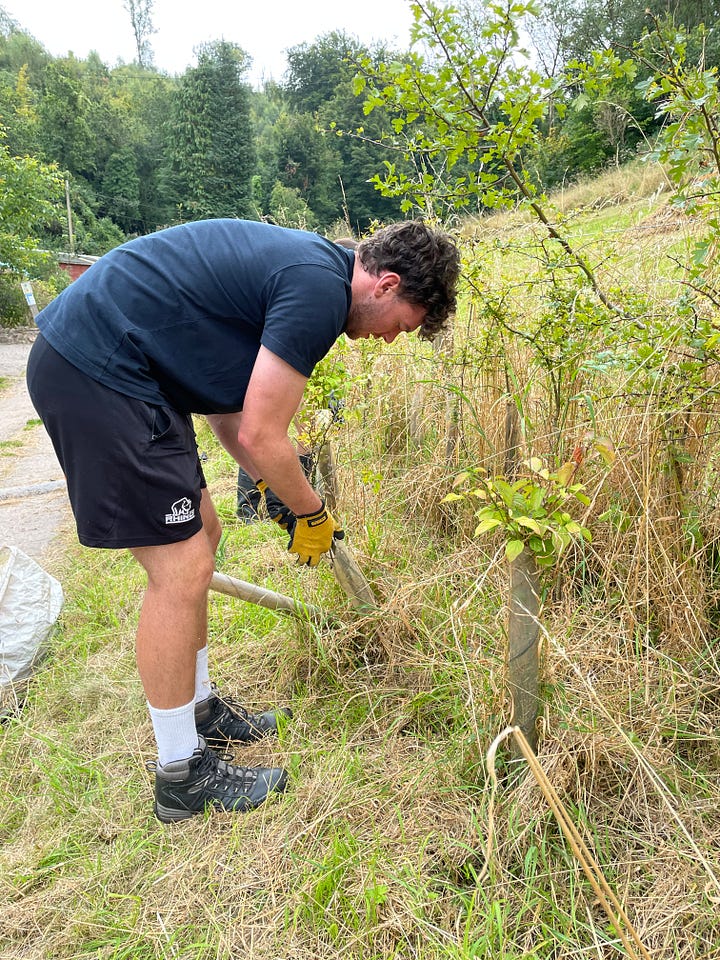Hedging Our Bets: How we Freed the Trees
Wild Notes #9 Boiling ants, humbug snails and a tangle of roses
Hi, I’m Sanjida! I write about writing, wildlife and wilderness. This is one of my monthly-ish dispatches from our rewilding project in Somerset, Wild Pinebeck.

I peeled back the spiral of the tree guard. At the top, there was a tiny snail, striped yellow and sepia-brown like a humbug. Suddenly, the whole tree guard seemed to fizz and then boil over. Wood ants poured out. Some of them, the soldiers, rushed over my hands (later my arms swole, the skin stretched taut, red and burning). Others grabbed larvae, minute as grains of rice, and rushed out, helter-skelter. The ants had been using the tree guards as a high-rise apartment block, cocooning their young against the sapling’s trunk and the plastic sides.
In lockdown 2020 we were lucky enough to receive a grant from The Woodland Trust for the hedge and we planted over 1,000 wildlife-friendly hedge plants: hazel, hawthorn, dog rose, guelder rose, dog wood and field maple interspersed with rowan trees
Hedgerows are immensely valuable for British wildlife, serving as crucial habitats and corridors that support a wide range of species. They provide shelter, food, and nesting sites for mammals, birds, insects and plants. Species such as hedgehogs, dormice, bats and birds like yellowhammer, nightingales and whitethroat nest within them. Insects, including bees and butterflies, benefit from the shrubs’ nectar-rich flowers and they’re also a refuge for amphibians and reptiles, helping them to move between different habitats safely.
Unfortunately, the UK has seen a significant decline in hedgerows over the last century. Since the Second World War, it’s estimated that the country has lost more than 50% of its hedgerows due to urbanisation, intensive farming and land clearance.




In January 2025 our hedge will be four years old and the trees had become a little cramped in their plastic tree guards. Fortunately for us, we managed to strong-arm, I mean, persuade, our nephews, Jamie and Daniel, to stay with us for a weekend. In return for cake and beer, they helped us remove all 1,000 tree guards.
Jamie, Daniel, my husband, Jaimie, and I perched precariously on the bank, half in the hedge itself, and threw down the brittle, broken guards and bamboo stakes into the bridlepath. Our daughter, Jasmine, gathered them all up into old feed bags to be recycled or given to the Somerset Wildlife Trust’s Hedge Project. At one stage I became so entangled in a dog rose, Jasmine had to come and rescue me, unhooking the scimitar-shaped thorns from my hair.
Jamie and Daniel also powered through a load of wood chippings, wheel barrowing them up the hill to repair the paths through Lilac Wood.
Once we had finished, we took a celebratory walk through the wood and along the hedge. Now that the hedge was released from its plastic wrapping, we could see that parts of it were thriving. The dog roses are filled with orange hips, there’s a scattering of blood-red haws and bunches of guelder rose berries glow like cabochon-cut carnelians. In others, the mini trees are thin and weedy. I have no idea why.


But what I’m hoping is that by spring, the hedge will bush out and become a dense line of creamy hawthorn flowers and delicate pink dog roses; that it will become a safe haven for nesting birds, provide a mini highway for dormice and a source of nectar for our pollinators. And perhaps our nephews will be back for more cake and beer.
If you liked this, you may be interested in more Wild Notes, such as:
Planting Oaks Under Whose Shade I Will Not Sit
Eating Flowers - How to Make Lunch Out of Leaves
Or my book, Wilderness, about our rewilding journey and my search for belonging.
And don’t forget, you can come at stay with us at Wild Pinebeck: 10% discount for members of Wild Writing with Sanjida!
Don’t feel able to subscribe? Perhaps you’d like to buy me a coffee instead?





A lovely read, Sanjida. It's great to read about how nature is nurtured and evolves around your home. My favourite phrase is 'mini highway for dormice'. The other day, I saw a wriggly grey tail disappear behind some Leylandii. Maybe you could get a few writers to stay at your lovely retreat/nearby to help you next year ;-) I hear wine and olives are just as good as cake and beer ;-)